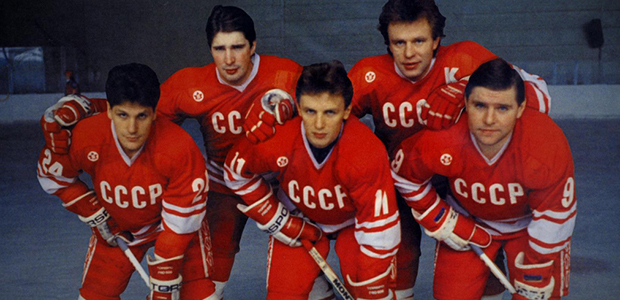
It is often difficult to separate nationalism from sports. Gabe Polsky’s enthralling Red Army takes a look at how nationalism and politics during the Cold War became the backdrop of a great chasm in the world of ice hokey between Russian ice hokey players and their government’s nefarious control tactics.
Put together using interviews conducted of the core Russian ice hokey team who dominated the sports during the 80’s, Polsky uses an entertaining, energetic and sometimes confrontational approach with his subjects. The most fascinating of these is Slava Fetisov, who was captain of the Russian team and whose impeccable style on the rink (we are shown clips of how effortlessly he could skate backwards faster than most people would skate forwards) brought him to the attention of the NHL. This of course did not sit well with the backers of the Red Army Hockey Club (which, we are told, was found under Stalin) who then ostracized Fetisov and went after others who, in their opinion, wanted to ‘defect’.
One of the best things about Red Army is listening to Fetisov talk. During interviews he comes across as sure-footed, confident and arrestingly charismatic. His tête-à-tête with the off-screen director provides many laughs but also his thoughts on what he was going through during those tumultuous times when he was made a pariah. The film almost seems to take the competitiveness between the US and Russia to the level of a war, which just meant that the stakes were that much higher for Fetisov and his compatriots in the team. The documentary’s most insightful aspect however becomes how it explores not just the friendship between players but perhaps most perceptively, the difference in style between the Russian and US teams. While the former were more about team dynamics and camaraderie, the latter played their game in a more rigorous pursuit for personal and individual glory, hinting at the contrast of how both these societies functioned in general at the time.
Not being much of a sports fan, I was in awe of the many revelations in the film – from the fact that the Russians really ruled the sport at the time (I always assumed it was the Canadians) to the grueling tactics used to train them and also how the game was used to further a sort of political agenda (teams visits to foreign countries was accompanied by personnel from the KGB). Good documentaries are about more than their subject and Red Army rises to the challenge, managing the feat of being both a history lesson and a rousing sports film.
Rating: 



